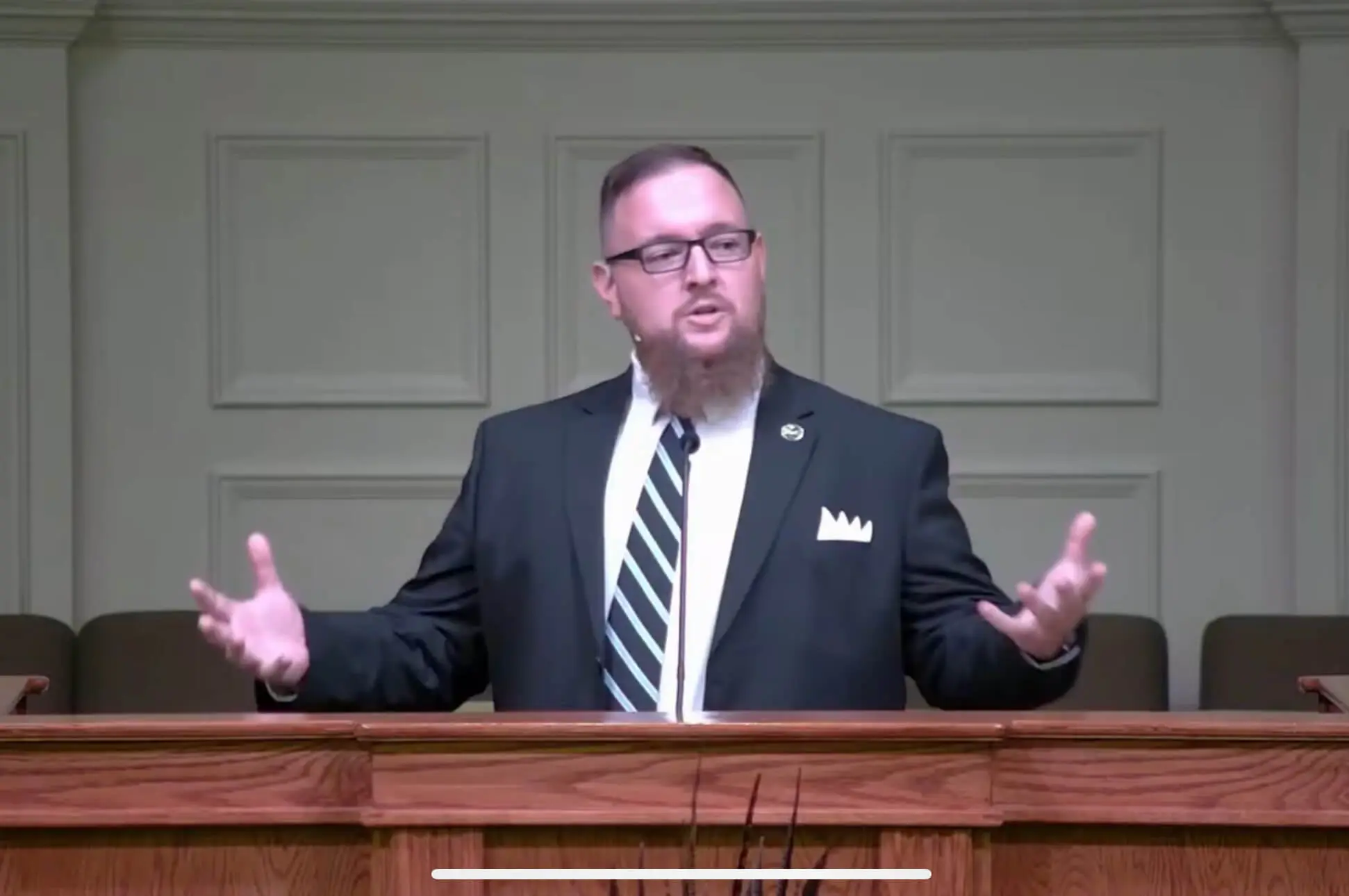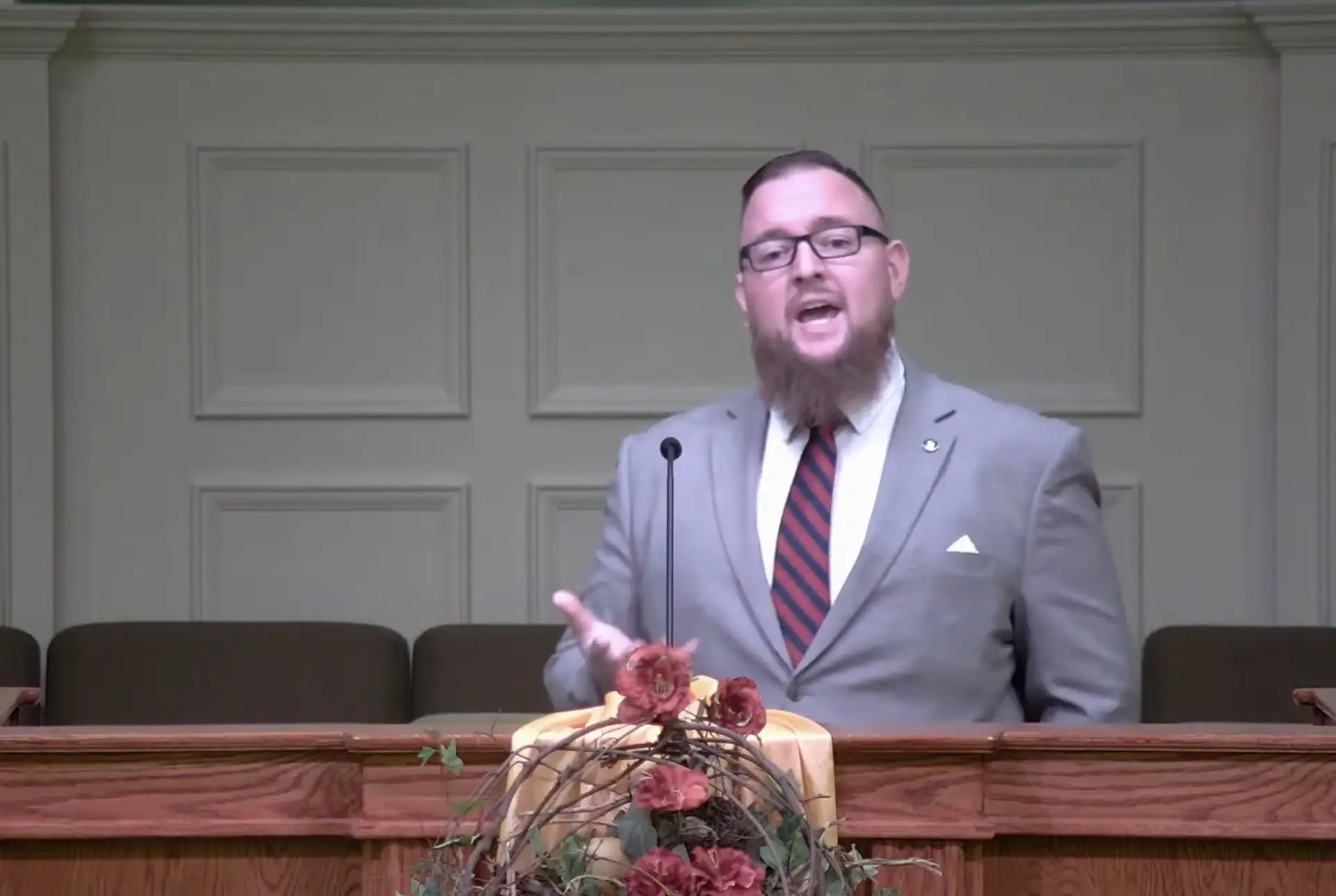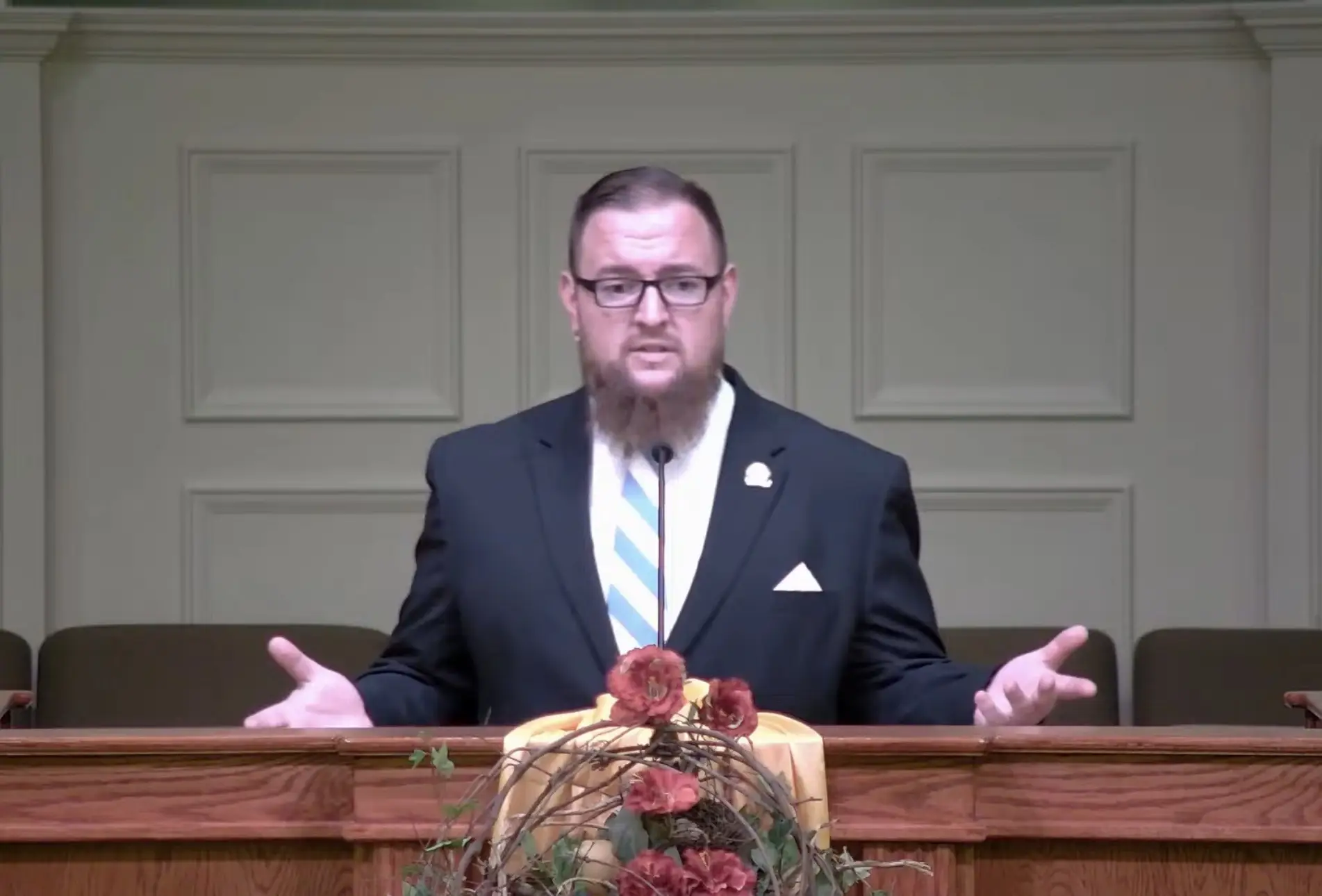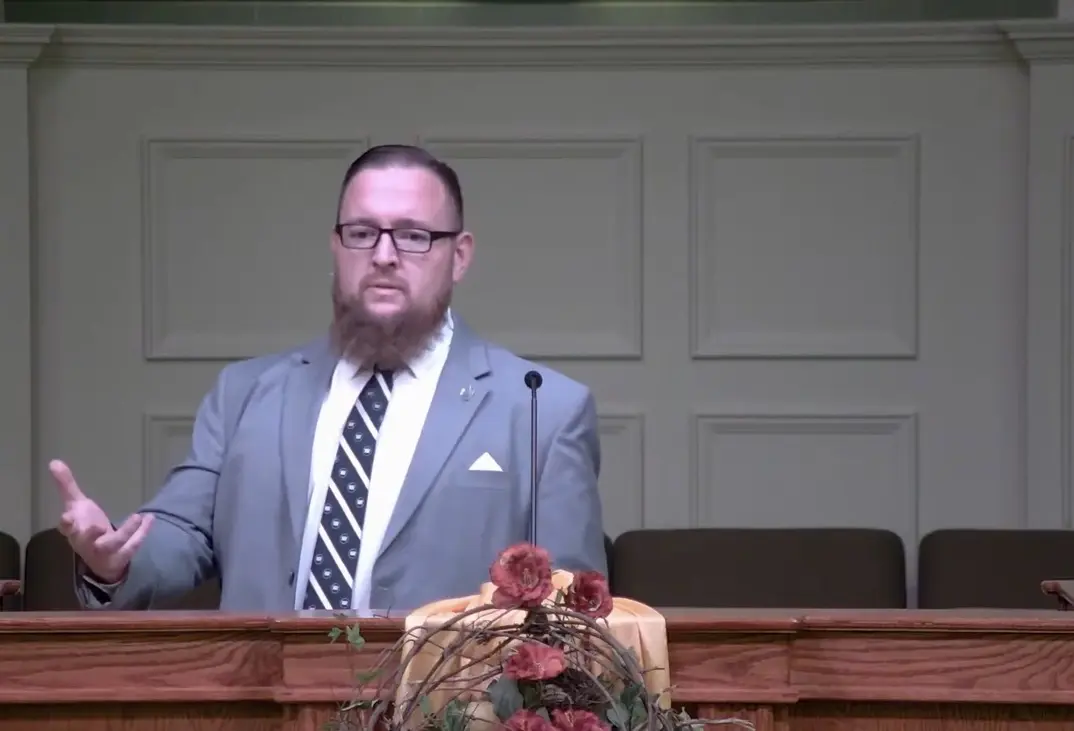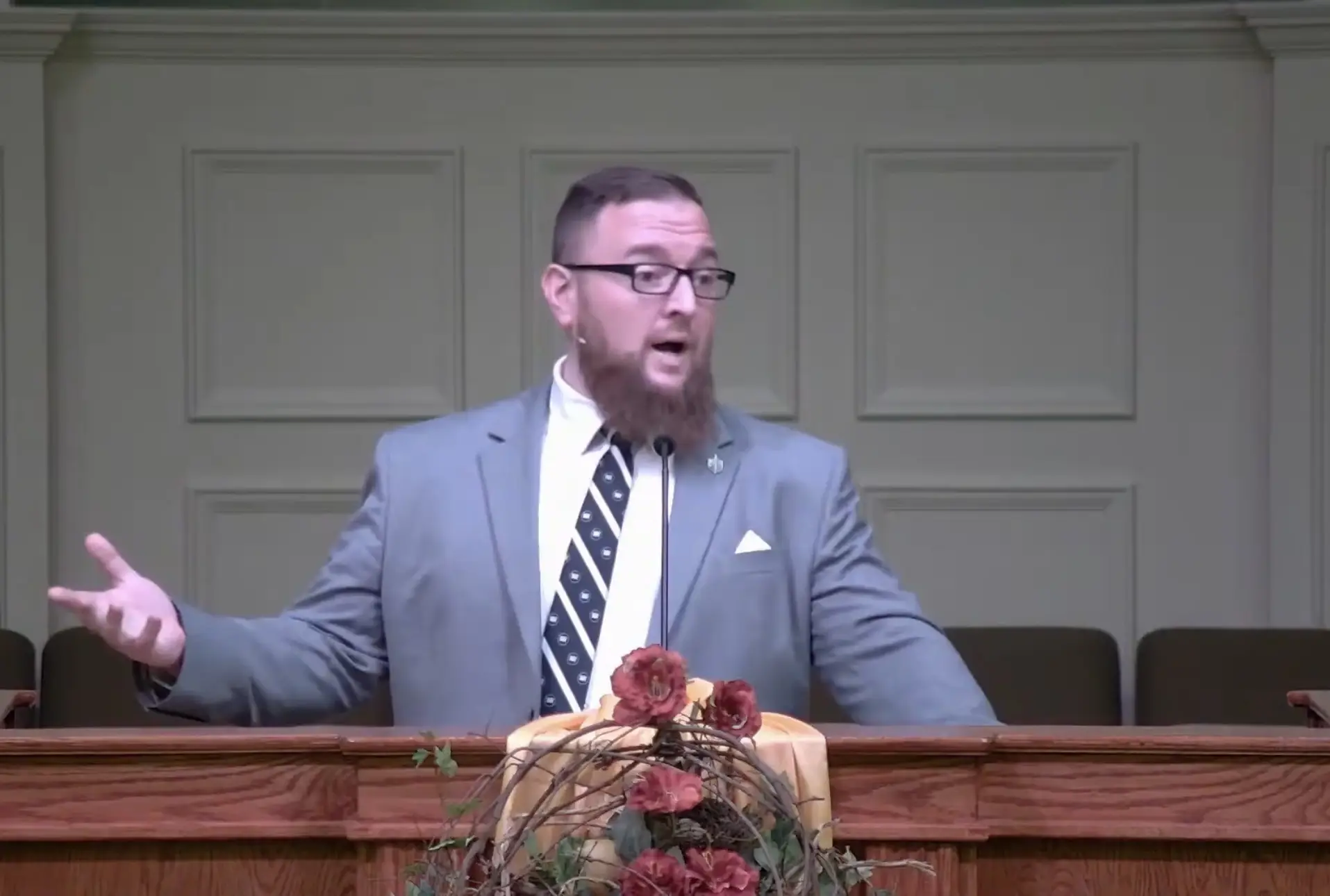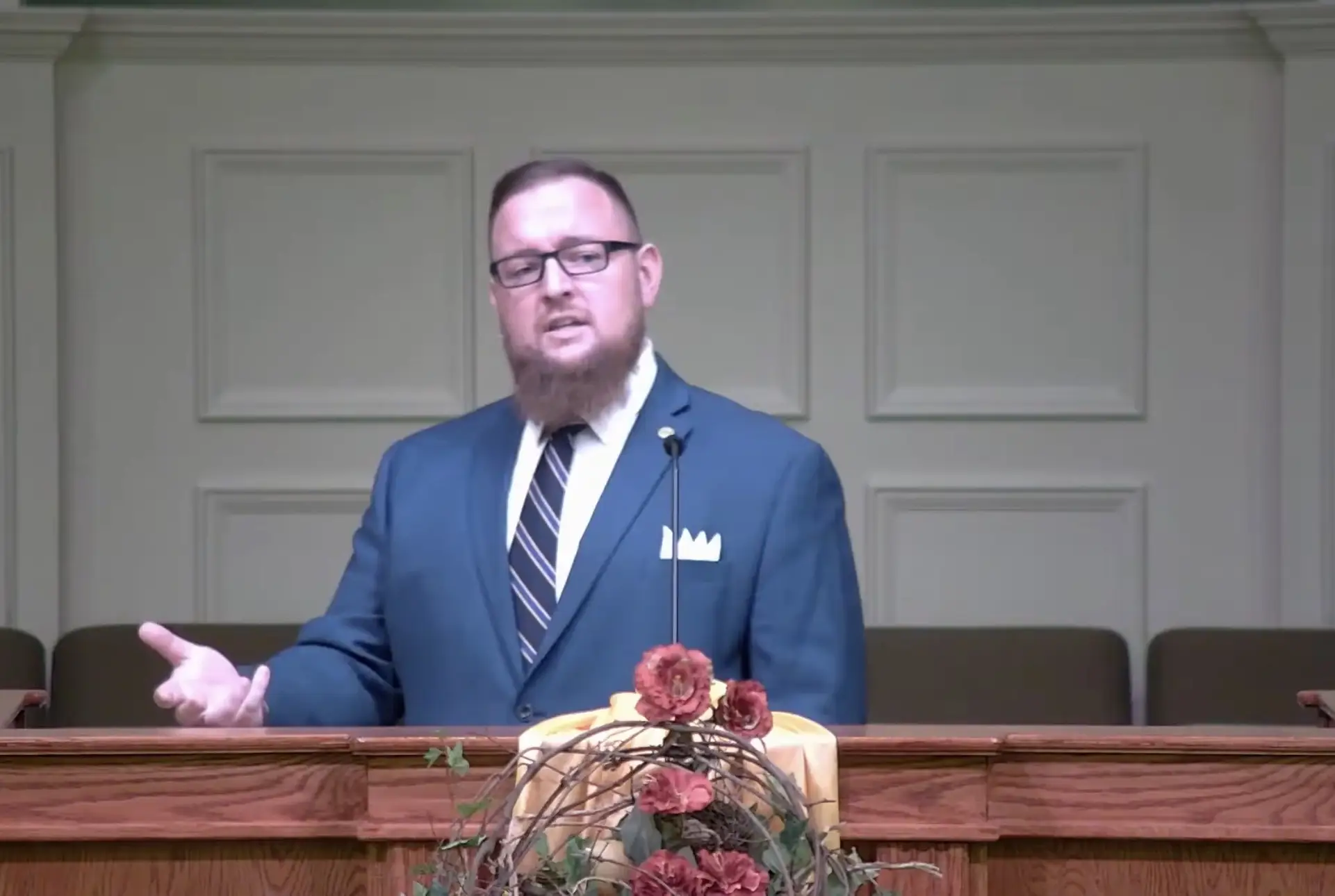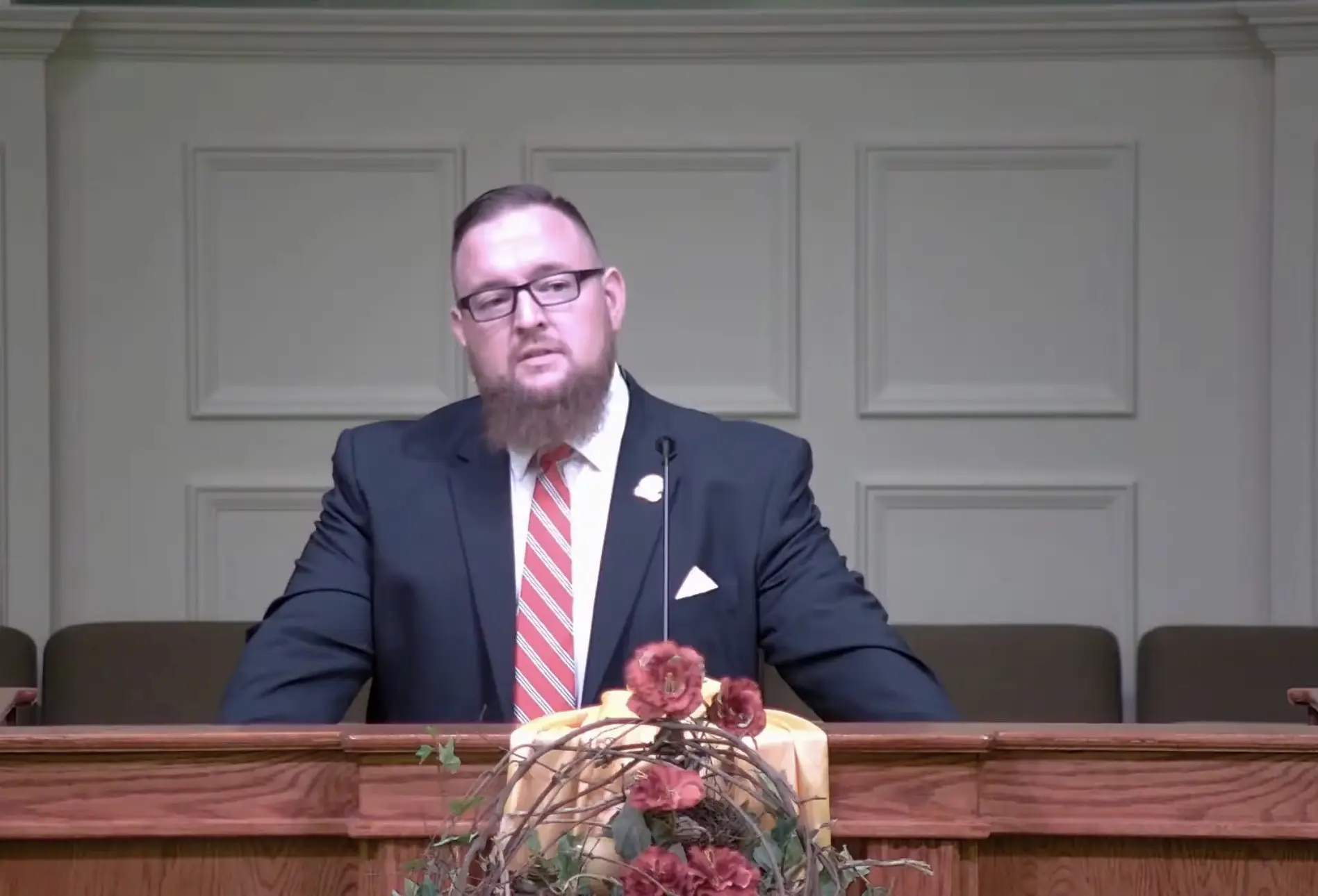Video
“Living Water Pt. 2”
John 4:16-26
Pastor Ryan J. McKeen
07/13/2025
Audio
Transcript
Well, turn with me in your Bibles to John chapter 4. John chapter 4.
VBS is always an exciting week. It’s a week that I always enjoy and look forward to for several reasons. As a pastor, it is always good to see so many people from the church, seeing the saints being equipped for the work of the ministry, being involved in this time that we take every summer to do this ministry that ministers to these children that will be coming in. But another reason is because of the opportunity of evangelism that we have in VBS. VBS is not just about providing child care for children during the summer or providing a fun time or any of the things that do happen at VBS. The point of VBS is to show these children Jesus, to explain to them the gospel and their need for a Savior.
And VBS holds a special spot in my heart because it was through the ministry of VBS when I was five years old that I came to know Christ, that hearing our teacher who at that time I remember it was our pastor’s daughter in my group that explained to us the gospel that day. And then I went home that night and talked to my parents about what I heard. and through their explaining and helping me understand things, it came to place my faith in Christ because of the ministry of VBS. So that, again, is another reason why VBS is special to me. And again, it points us to the real reason why we do this, is to show these children who Jesus is.
And what we see in this passage this morning is a perfect model of evangelism. Sometimes we, in our own minds or our own apprehension toward evangelism, we tend to overcomplicate things. We think about all the things that I might get wrong or the things that prevent me from seeking opportunities for evangelism. And this passage so well simplifies what it is to share the gospel with somebody. And that’s what we see here in John chapter 4. We began this passage last week, and we saw that just like the chapter before, John chapter 3, this begins with an encounter. In John chapter 3, Jesus encountered Nicodemus. He was a well-educated, important, well-known teacher in Israel.
Well here in John four, Jesus encounters someone totally different. Really someone on the opposite end of the social spectrum here. Jesus meets this Samaritan woman. And as we talked about, this woman was not someone that a Jewish man like Jesus should even be talking to. And this woman was stunned that Jesus spoke to her. It was culturally inappropriate for a man, and especially a rabbi like Jesus, to speak to any woman, especially an immoral outcast like this woman. But that doesn’t stop Jesus, as he comes and sits at the well and asks for a drink. And this was, as we spoke of last time, a divine appointment. that Jesus would meet and talk to this woman. We saw that he must pass through Samaria. There were other routes to get to where he needed to go, but Jesus felt compelled to pass through Samaria and come to this very well and talk to this very woman. And last week, we began to look at how this conversation began. And we saw that one of the main thrusts in this whole passage, really the whole point of this chapter, is to reveal to us who Jesus is.
That is John’s point in the gospel, to show us that Jesus Christ, He is the Christ, the Son of God. And here in this passage, we see things revealed to us about Jesus. We see his humanity and his deity revealed to us. We see his humanity revealed in his weariness. As he came to the well in the middle of the day, as he’d been walking this long distance, and he was truly physically exhausted. And he needed a drink. This was not just an opportunity that he could strike up a conversation with this woman. He really needed a drink. He really was thirsty and worn out. He really did experience what it’s like to be a weak and tired human being. And this passage also shows us that he is God. He is God in the flesh. And we’ll see that today as Jesus reveals to this woman that he knows everything about her. That even though she tries to hold back details that he should not know, he knows. He knew things that only God could know.
As this woman says later on in verse 39, she was blown away by his knowledge and that is what convinced her of who he is. She says in verse 39, he told me all the things that I have done. He knew. And again, that is the overarching theme of this passage, where you see the humanity and deity of Jesus on display. But even within that big picture, you see other things going on here. You see other themes and other emphasis. that happen in this passage. This is a longer passage. Really, this whole episode runs from verse 1 all the way through verse 42. And you really can’t cover all that at once, because there are so many things that happen in these verses.
You see, Jesus in the passage today speaks about true worshipers and how true worshipers of God worship in spirit and in truth. And we’ll have to come back to that next week. And we’ll focus in on what Jesus is saying here in verses 23 and 24. But again, today what we see and what we will focus on is an example of evangelism. by our Lord Jesus Christ. An example of what it means to share the gospel, what we must do to bring the good news to people. Last week we saw Jesus introduce this idea of living water, that he had this living water and that if anyone drinks from this water that he will give, they will never thirst again ever. That he has this living water that satisfies. And Jesus’ analogy of living water is speaking about salvation. That he can provide what truly satisfies. And Jesus shows us his incomparable greatness in that whoever drinks from his well will never thirst. And this water that he will give will not only quench their thirst, but it will become a well of water springing up to eternal life. That they will overflow with this living water and it will spread to others. And as we’ll continue in this passage in coming weeks, that’s exactly what happens with this Samaritan woman. The well of water springs up in her and it spreads to the people of Sychar. But here, this living water of spiritual life is exactly what her thirsty soul needs.
Jesus is bringing her to an understanding of what she really needs. She doesn’t see it at first. She doesn’t get it. She missed the point. And so she asks, in the last verse we ended on last week, in verse 15, she asks so that she could receive this water so she wouldn’t have to keep coming back to this well. She wants to alleviate a chore in her life. She wants to quench her physical desires. But Jesus is showing this woman what she really needs. Again, she doesn’t see it yet, but He does. You can see what Jesus is doing here. She needs water to live, that’s true, but she needs more than that to live eternally. And Jesus is about to show her that in our passage today. At first, she seems willing to accept this living water, but she does not know what that entails. And Jesus is about to show her what it means to drink from his living water.
As with any lost sinner, as this woman is, as each one of us was at one point, or maybe still is, This woman needs to understand two important things in order to partake of this living water, in order to come to salvation. First of all, as we’ll see, Jesus explained to her. First of all, she needs to see the reality of her sin. She needs to see her sinfulness. And secondly, she needs to see his true identity as her savior. And so that’s how we will structure this passage this morning. We see the two essentials in sharing the gospel. You need to show them the problem of sin, and you need to show them the solution, their savior, because that’s what Jesus does for this woman.
So I’ll read again our passage we’ll focus in on this morning, verses 16 to 26 of John chapter four. John chapter four, verses 16 through 26. Again, this is the word of the Lord. He said to her, go, call your husband and come back here. The woman answered and said, I have no husband. And Jesus said to her, You have correctly said, I have no husband. For you have had five husbands, and the one you now have is not your husband. This you have said truly. The woman said to him, sir, I see that you are a prophet. Our fathers worshiped on this mountain, and you people say that in Jerusalem is the place where men ought to worship. Jesus said to her, woman, believe me. An hour is coming when neither in this mountain nor in Jerusalem will you worship the Father. You worship what you do not know. We worship what we know. For salvation is from the Jews. But an hour is coming, and now is, when the true worshipers will worship the Father in spirit and truth. For such people the Father seeks to be His worshipers. God is spirit, and those who worship Him must worship in spirit and truth. The woman said to him, I know that Messiah is coming, he who is called Christ. When he comes, he will declare all things to us. Jesus said to her, I who speak to you am he.
So again, there’s a lot in these 10 verses. There’s a lot here. And we’ll Focus on some of it this morning, and we’ll come back next week and finish out really all the important detail contained in Jesus’ answer here. But first we see, as we continue on, we left off in verse 15 last week, and first we see here the problem of sin. The problem of sin. As this woman tells Jesus, she wants this living water. Jesus immediately gets to the heart of the matter here. Because in verse 16 he says to her, go, call your husband, and come back here. Again, since she failed to grasp the significance of this water that he spoke of, Jesus intentionally directs the conversation to her need for repentance. and salvation. He exposes the heart of the issue, which is her sin. And everyone who truly thirsts for righteousness, for the salvation God provides, must confess their sin and forsake and turn from their wicked ways.
We began this service this morning with our call to worship from Isaiah 55. And there we see this need for repentance. This repentance that Jesus preached, to repent and believe the gospel, this repentance is nothing new. This is not a new idea. God had been calling his people to repentance since he called them as his people. We see in Isaiah 55, as we read earlier, verses six and seven, Seek Yahweh while he may be found. Call upon him while he is near. Let the wicked forsake his way, and the unrighteous man his thoughts. And let him return to Yahweh. And he will have compassion on him. And to our God, for he will abundantly pardon.
In Isaiah, God is telling Israel how to be saved. A people who needed salvation. And He was telling them what they must do. And it hasn’t changed. Seek Him. Call upon Him. And in order to do that, you must forsake or turn away from your sin. Turn to God. And it says He will have compassion on you and He will abundantly pardon you. This is faith and repentance. The Bible knows nothing of a salvation without repentance. I mean, salvation always involves turning away from your sin, seeing your sin like God sees it, as an offense against a holy God. As Paul, as he explains salvation throughout the New Testament, he explains it this way. As he’s testifying to King Agrippa in Acts 26, he’s explaining what he’s been doing. He’s on trial, and he’s explaining to King Agrippa, this is what I’m going around and doing.
Acts 26, verses 19 and 20, he says, so King Agrippa, I did not prove disobedient to the heavenly vision, but kept declaring both to those in Damascus first, and then at Jerusalem, and throughout all the region of Judea, even to the Gentiles. And what did he declare? That they should repent. and turn to God, practicing deeds appropriate to repentance. Paul did not go around teaching people about Jesus and saying, all you have to do is pray this prayer. Repeat after me and you’re good to go. No, he went around preaching, repent and believe in Christ. Repent. as he gives testimony of the acceptance he had in Thessalonica in his letter, his first letter to the Thessalonians.
First Thessalonians chapter one, verse nine, he says, for they themselves report about us what kind of entrance we had with you. And how did they have an entrance with these people? You turned to God from idols. to serve a living and true God. This is Paul’s testimony of these people, how he knew they were Christians, how he knew they were true believers, because they turned away from their sin and they turned to God. Repentance is the evidence that you actually are a believer. Jesus didn’t come to make sinners perfect in heaven someday, and you can not worry about sin now, just continue in what you’re doing. As Paul said in Romans 6, what shall we say then? After he’s explained the problem of sin and then the solution in Christ, he says, what shall we say then? Are we to continue in sin so that grace may abound? Well, since we’re forgiven, We might as well continue, right? It’s covered. We can do what we want now. May it never be. May it never be that we desire to continue in our sin. How shall we who died to sin live in it? Repentance. Turn from your sin to God.
This is what Israel was continually rebuked for in the Old Testament, because they would not turn from their idols and from their sin. I’ve been reading in the book of Jeremiah in my Bible reading lately, and this is the very problem Jeremiah keeps bringing before their eyes. They claim to be God’s people. And they claim that they worship God. And they come to worship Him in His house on the Sabbath. And then they go live lives of sin every other day of the week.
Jeremiah 7, verses 9 and 10, he confronts this to their face. Jeremiah 7, nine through 10 says, will you steal and murder and commit adultery and swear while you’re lying and burn incense to Baal and walk before other gods that you have not known and then come and stand before me in this house which is called by my name and say we are delivered so that then you can go do all these abominations? That is an offense. to God, to come to his house, claim to be his people, and then walk in sin. And God is saying, how dare you? How dare you claim to be my people when you live like you follow these other gods? No, Jesus died. so that we could be saved from sin and so that we would turn from sin.
We see that in Titus chapter two. Jesus gave himself for us so that he might redeem from all lawlessness and purify for himself a people for his own possession, zealous for good works. This is what it is to be a believer. This is what it is to be a Christian. And those who do come to him and truly do receive this living water have been freed from sin. And they have become slaves of righteousness. You see, Jesus knew this woman. He knew what she was like. He knew what she did. And he knew exactly what she needed. And so he asks her a question that he knows will expose her sin. And he offers her the opportunity to confess this sin and to receive forgiveness.
And the woman responds in verse 17. The woman answers and said, I have no husband. Jesus gives her the opportunity. Go call your husband. And she says, I have no husband. Now technically she’s not lying. She’s not married. She doesn’t have a husband, but she’s not telling the whole truth either. So Jesus responds in verses 17 and 18. Jesus said to her, you have correctly said, I have no husband. For you have had five husbands, and the one you now have is not your husband. This you have said truly.” Jesus says, yes, I know. I know you have no husband. That’s why I asked the question. I know you have no husband. In fact, let me tell you what I do know about you. This is another instance where Jesus pulls back the veil just a little to show people who he is. It’s like Nathaniel, do you remember? In chapter one, from where do you know me? How do you know what I’m like? Jesus shows this woman who he truly is by revealing his omniscience or his knowledge of everything.
Just like with Nathaniel. And while he does commend her for the truth of what she did say, he says, you did not go far enough. He uncovers all of her sin. And it should show us a few things here. First of all, it should show us how Jesus views marriage and the sexual ethics of Jesus. What he sees as right and wrong. Because not only does he point out the multiple marriages and the failed marriages that undoubtedly were the result of sin in some way or another, but he also points out our current situation. Jesus rejected the idea of two people living together outside of marriage. He says, yeah, I know you’ve had five husbands. but you’re also living with a man who’s not your husband. It wasn’t as though her not being married for a sixth time was a good thing. Jesus says, yeah, no, I know about this too.
I know about all the marriages and I know about your current situation. And it’s all outside of God’s design for one man and one woman forever in marriage. Jesus points to it all. But He does not say that because of that she is outside of His reach. He does not say that she is untouchable because of her situation. Because of the sin that led to her situation. He simply reveals it. He reveals it to her. And He shows that He already knows about it. And that she can’t hide it from Him. And we should learn from this too. He already knows. He already knows about all of our sin. There is nothing that you’re hiding from Him. There is nothing that He does not see and know. Jesus knew about all of our sins before He died for us.
So you’re not outside of His saving reach. There’s nothing that you’re going to hide from Him. So why is it that we keep things inside our hearts and don’t pour them out at the feet of our Savior? and confess all of our sins, the wickedness that we hold on to, that we want for ourselves and we think that nobody knows about, He knows. He already knows. So you’re not keeping anything from Him. So why aren’t we confessing all of our sin to Him? You’re not going to surprise Him with anything you tell Him. He already knows.
So how does this woman respond to the fact that Jesus knew all of this about her? Verse 19, the woman said to him, sir, I see that you’re a prophet. I see that you’re a prophet. There’s a lot going on in this response too. First of all, she acknowledges that he’s right. Yes, you’re correct. You must be a prophet if you know and you were exactly right about my situation. She didn’t need to hide her sin anymore because he knew he was right. But calling him a prophet is a big deal for a Samaritan. Because if you remember, as I mentioned last week, the Samaritans only believed in the Pentateuch, the first five books of the Bible. And there’s only one prophet there, and that’s Moses. But Moses said there would be one coming.
In Deuteronomy 18, chapter 18, verse 18, Moses, speaking on behalf of God, says, I will raise up a prophet from among the brothers like you, and I will put my words in his mouth, and he shall speak to them all that I command him. Now, Samaritans, they rejected all the rest of the Old Testament, so they rejected all the rest of the prophets. So for a Samaritan to say, you’re a prophet, it shows us something about what’s occurring in her mind. While her understanding of who Jesus is is not complete yet, She’s starting to come along. She’s seeing something here. And Jesus is leading her along. And again, this teaches us something about evangelism. People that you share the gospel with are not gonna understand it all at first. All of our understanding was infantile at first. We only knew what we knew. And so you might get things wrong at first, but she’s starting to pick up on there’s something different about this guy. There’s something going on here. And she says, I can see that you’re a prophet.
And so Jesus starts with her sin. And once she saw her sin, she began to see that there was more to this Jesus than she thought. And Jesus will help her in her understanding. But first we’ve seen, number one, the problem of sin. Jesus has effectively presented to her her sin. And she has admitted that he was right. He showed her her sin, that she is a sinner, she’s got a problem, and she acknowledges that he’s right. And number two, secondly, we see the solution. He shows her that He is her Savior. Because this woman understands that there’s more going on here than she thought. But her understanding is incomplete. And so, in verse 20, she asks a question. She admits he’s a prophet, and then verse 20 she says, our fathers worshiped on this mountain, and you people say that in Jerusalem is the place where men ought to worship.
Some people see this as her changing the subject, trying to skirt away from her sin because she doesn’t want to address it. I don’t necessarily think that’s what’s going on. I think she rightly sees this guy is different. There’s something special about him, because she admits he’s a prophet. She begins to test his understanding, his knowledge, to see if this really is a legitimate spiritual authority. So she presents this issue, this thing that separates the Samaritans and the Israelites and the Jews. So she’s testing the waters a bit. And she’s been shown her sin again. And she’s seeing where this goes.
But as you see Jesus’ response, you see a shepherd leading his sheep along. Because this is a controversial issue. And she presents this idea that divides these people groups. And as we see Jesus’ answer here, we’ll come back to the significance of his answer. But for today, we will just read through this conversation and see the conclusion that he comes to. Because in verses 21 through 24, we see his answer. Jesus said to her, woman, believe me, an hour is coming when neither in this mountain nor in Jerusalem will you worship the Father. You worship what you do not know. We worship what we know, for salvation is from the Jews. But an hour is coming, and now is, when true worshipers will worship the Father in spirit and truth. For such people the Father seeks to be his worshipers. God is spirit, and those who worship him must worship in spirit and truth.
Again, there’s a lot in that answer, and we’ll come back next week and dig into that. But for now, what we see is Jesus does answer her question, and he answers it with authority. He really does address the Samaritans’ bad theology. Because he says, you worship what you do not know. And we worship what we know. For salvation is from the Jews. But then instead of getting hung up on this issue that divides them. He looks past it. In points to the day that is coming. The day that he came to bring. The day when God’s true worshipers would worship him sincerely. But again, Jesus does not get sidetracked with this theological problem. He doesn’t turn it into a debate with this unbeliever. He answers her question and he’s still focused on her heart. Because of his answer, the woman responds again. And this time the woman said to him, I know that Messiah is coming. He who is called Christ. When He comes, He will declare all things to us.
This woman is hearing things she’s never heard before. She’s hearing someone speak like no one has ever spoken before. And Jesus is leading her to an understanding of who He is. And so, as her questions were answered, and her interest is piqued here, She floats out this statement about the Messiah. And you might be wondering, where is she getting this from? Where is she going in this conversation? She keeps throwing out these ideas. But she sets it up for him to answer, and you can see her interest in floating the idea of the Messiah. And again, she’s testing the waters to see who this man really is. And she says, I know Messiah is coming. John clarifies, it’s the Christ, the one who is called Christ. But he says, I know Messiah is coming, that much I do know. I may not know everything, and this man has already shown me more, that he knows more than I do, but I know that Messiah is coming, that much I do know. And you can hear the hope in her voice.
You can hear the hope in her statement here. And not just the hope that he’s coming one day, But you can hear the hope that maybe this is Him. Because she brings up to this man that knows things that only God could know. And that speaks with the authority that only God could have. And she floats the idea of the Messiah. She’s in effect saying, what do you think of the Messiah? Tell me about the Messiah. And Jesus answers in verse 26. Jesus said to her, I who speak to you am he. That’s the exact answer she was hoping to hear. That’s what she was after. You know, our English versions just don’t capture the significance of the way this is stated, and that’s just the way that language works. But do you realize what he says here? Do you realize what he’s saying?
Literally, Jesus says, in response to her question about the Messiah, Jesus says, I am. I am. And then he clarifies the one who’s speaking to you. So his answer to her suggestion about the Messiah is to claim the divine name of God. I am. In Greek, this is the phrase ego eimi, which is I am. This is how the Greek language translates the name of God in Exodus 3.14, where God said to Moses, I am who I am. And he said, thus you shall say to the sons of Israel, I am has sent you. In Moses’ fear and trepidation over whether or not he can do this, God says, I am. Moses, you should believe me because I am. Moses, you should obey me because I am. And Jesus says to this woman, I am. The I Am who sent Moses is standing before you.
This is an I Am statement of Jesus. And typically we think of the seven famous I Am statements that go along with a description You have the typical seven that I am the bread, I am the light, I am the door, I am the good shepherd, I am the resurrection and the life, I am the way, the truth and the life, I am the vine. All of those I am statements, they communicate something specific. But there’s more than seven. Jesus continually claims to be I am. 23 times in the book of John. He answers with, I am. And they all echo who he truly is. Because just as Moses was supposed to trust in his deliverer simply because he is, I am. Even so, we are to trust in our deliverer, Jesus Christ. Because he is the same, I am. And this is the one who this woman was after and he is standing before her. The great I am. And Jesus’ words to this woman changed everything. They were the very words of life. They were the words of living water springing up to eternal life. The man who just a few minutes earlier asked her for a drink of water.
Now he declares to her, I am that long-awaited Messiah. You see, unlike Nicodemus, she knew nothing about his signs and miracles and all the things he’d already been doing. But because of what he knew about her, because of what he revealed to her, little by little, she sought him. He showed her her sin. She acknowledged her sin. And then she saw her Savior. Because of who He is, because of who He revealed Himself to be, she believed. There was no music. There was no smoke and lights. There was no aisle to walk. There was no prayer. No repeat after me, there was no prayer in this passage. Jesus did two things. He showed this woman her sin and he introduced her to her savior. And she believed.
He laid the truth before her and he allowed the truth to work. That is the gospel. That is evangelism. And we get so distracted and bogged down with the man-made methods of our evangelism, the things we have to do, the modes and methods that we have to accomplish in order to truly evangelize. And then we get worried about not doing it right. Well, what am I going to say? What if I don’t know the answers to all their questions? What if I say the wrong thing? And we scare ourselves out of sharing the gospel. Because none of those things are what evangelism is truly about. Do you trust in the power of the Word or not? Romans chapter 10 tells us how it is people come to faith. How it is they believe? And down in verse 17 of Romans 10, faith comes by hearing and hearing by the Word of Christ. Give them the Word of Christ. That’s how faith comes about.
And you know, evangelism is not about making converts. Evangelism is not about making converts. That’s sometimes the result of our evangelism. But biblical evangelism is about faithfulness. It’s about sharing the good news. It’s about presenting the truth, the Word, the Gospel to people. And then allowing that Word to have its effect. Allowing the Spirit to do His work.
Sometimes the Word’s effect is that He brings about faith in the heart of the hearer. And sometimes, that very same word hardens their heart. And with both of those results, we can be successful in evangelism. Because success in evangelism is about faithfulness, not results. It’s not about the numbers of people who respond in the way we want them to respond. It’s about did I share the truth? Did I share the truth with people? We show people what sin is and that they are sinners. And we tell people about our great Savior who stands ready to save all those who put their faith in Him. And we call people to turn from their sin and trust in Him as their Savior.
That is what Jesus did by telling her He is the Messiah. She knew what that meant. She knew that she must trust in Him for her salvation. She had that much understanding. And if we present that truth, we have faithfully shared the gospel. And we leave the results to Him. He will bring in His own. Every last one of them. And he brought in this Samaritan woman. And then she went and proclaimed it in her village. That’s a sign that she did genuinely come to faith in him. The fruit was seen. That is evangelism. That is what people need to know about salvation.
First, that salvation comes to those who recognize their need for it, their need for spiritual life that they don’t have. That’s what we saw last week as Jesus told her about the living water that she didn’t have. And she wanted that water. And that living water is only received by those who realize their spiritual thirst. that they need something that they don’t already have.
And second, salvation comes to those who confess and repent of their sins. To see your sin for what it is, an offense against a holy God. And before this sinful, adulterous woman could embrace her Savior, she needed to see her sin for what it was.
And lastly, salvation comes to those who embrace their Messiah, who embrace Jesus Christ as the Christ, the Son of God. And by believing in Him, you will have life in His name. Because as Jesus says later on in one of His I Am statements, I am the way. the truth and the life and no one comes to the Father except through Him. Because there is salvation in no one else. For there is no other name under heaven given among men by which we must be saved.
It’s Christ. Christ is revealed to us in this passage and He shows us how it is that we are saved, and how it is we are to share the good news of Him. Jesus Christ is our only hope in life and in death.
Let’s stand and close in a word of prayer. Our God in heaven, we are amazed. We are amazed at your gospel. how simple it is. Lord, we pray that you would take away our fear and our apprehension to share the good news, that we would realize the simple truth that we are sinners and that we have a Savior, and that we would bring that truth to those around us who need to hear, those in our households, those in our communities, in our workplaces, in everywhere that we come into contact with your image bearers, that we would bring them the truth, and that we would bring them the gospel. Lord, we thank you for your word, and we thank you for this tremendous example that we have in our Savior, Jesus Christ. We thank you for who you are and we pray this in Jesus’ name. Amen.
